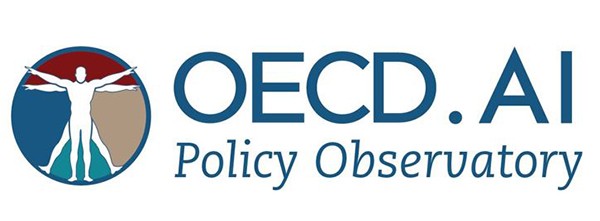
Introducing the OECD AI Policy Observatory
Artificial intelligence (AI) is changing the way we live and work, and it has the potential to transform virtually every sector of the global economy – from healthcare and education to transport and energy systems. It holds tremendous promise for economic productivity, scientific advancements and sustainable development. Yet there are also anxieties around where the technology may lead us, including concerns that it may codify existing biases and discriminatory practices, or displace workers by accelerating automation.
For governments, this presents a pressing question: how can we harness the potential of AI to improve well-being for all, while also mitigating the risks that it poses?
The OECD AI Principles – the first intergovernmental standard on AI – provide a way forward. Adopted in May 2019, the Principles promote a human-centric approach to AI that enables innovation, develops trust, and respects human rights and democratic values. All 36 OECD member countries and eight non-member countries have committed to these Principles, which also provided the basis for the G20 AI Principles endorsed by Leaders in June 2019.
Committing to this vision of human-centred AI marked a milestone in international co-operation – but it was just a first step. Now, countries have embarked on the critical task of translating their commitments into action.
Today, we take an important step toward this goal with the launch of the OECD AI Policy Observatory (OECD.AI), a comprehensive resource for real-time information on AI policy and research across the world. As an inclusive platform for public policy on AI, the Observatory brings together resources from across the OECD, our outside partners and a wide range of stakeholders, with the aim of facilitating dialogue and delivering multidisciplinary, evidence-based policy analysis. With insights across the spectrum of the OECD’s policy domain – including education, employment, public governance, finance and transport – the Observatory will become the go-to resource for countries putting the AI Principles into practice.
OECD.AI provides a wealth of information on trends in research and development, jobs and skills, and the latest AI news, as well as a repository of more than 300 AI policies and strategies from nearly 60 countries. Developed jointly with the European Commission, the repository covers policies and initiatives across a range of areas – from education and skills to health and transport – to enable policy makers and stakeholders to share and learn from each other’s experiences, monitor progress, and identify good practices.
The Observatory is not a platform for governments alone. It is a space for dialogue and collaboration among all AI stakeholders, including technical communities, the private sector, trade unions, academia, civil society and international organisations such as UNESCO, the Council of Europe, the World Bank, and the Inter-American Development Bank. Interested citizens can also find information on the latest developments in AI, thanks to technology provided by the Jožef Stefan Institute in Slovenia, as well as broader perspectives on how AI technology and governance have evolved since 1950, when Alan Turing first posed the question of whether machines can think.
For example, data from Microsoft’s Academic Graph show that the volume of academic publications on AI quadrupled from 1999 to 2019 (the volume of all academic research only doubled over the same period), and that research on artificial neural networks has skyrocketed since 2015. Academic collaboration between China and the US more than doubled from 2014 to 2019, according to Microsoft’s data, reflecting the emergence of these countries as global hubs of AI research.
OECD.AI also features real-time updates of AI-related news stories from across the world, as well as information on the rapidly evolving set of AI-related skills and jobs that markets demand. The skills and jobs data provided by LinkedIn, a data partner of OECD.AI, reveal important trends regarding both the penetration of AI-related skills within countries and the migration of these skills between countries. For example, countries like Luxembourg, Germany and the US are seeing high inflows of workers with AI-related skills, according to LinkedIn’s data. By contrast, India, China and Turkey are seeing significant outflows. Addressing the implications of such skills flows will be a key policy priority as AI continues to shape our collective future.
Today’s launch is only the beginning. New features will be added to OECD.AI in the coming weeks and months, and the platform will be continually updated with the latest information. It is our hope that the Observatory will serve as a platform for long-term international and multi-stakeholder collaboration, knowledge sharing and dialogue – a place where all parties can discuss AI policy issues and solutions, and measure collective progress.
Over its nearly 60-year history, the OECD has set international standards in everything from responsible business conduct to tractor safety, and has played a leading role in bringing countries together to address new and profound challenges. Our 1980 Privacy Guidelines, for example, formed the basis for laws across the US, Europe and Asia, and subsequent reviews are helping governments to keep pace with the digital transformation.
Forty years later, with AI fast pervading every facet of our lives, we once again stand ready to help countries across the world to ensure their AI systems are robust, safe, fair and trustworthy for all. In other words, less artificial and more intelligent.
Asesor en Desarrollo Sostenible con experiencia en Empleos Verdes
4yBrilliant! Most of us agree to “... promote a human-centric approach to AI.”
Talent Advisor
4yReally terrific event today hosted by OECD - OCDE in Paris. Focus was on the advantages of AI as well as unintended consequences if not approached with the right ethical parameters. Congrats to OECD for getting their AI Principles out into the world for others to consider/follow. I was proud that Linkedin data could contribute, even in a small way, to the Observatory they launched today. #ai #oecd #linkedin